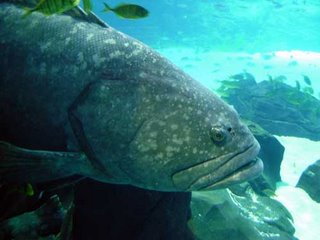 (photo taken at the Georgia Aquarium)
(photo taken at the Georgia Aquarium)
Did you Know?
The large size, slow growth, low reproductive rate, and spawning behavior have made the goliath grouper especially susceptible to overfishing. The goliath grouper is totally protected from harvest and is recognized as a critically endangered species by the World Conservation Union (IUCN). Furthermore, the IUCN concludes that the species has been "observed, estimated, inferred or suspected" of a reduction of at least 80% over the last 10 years or three generations. In U.S. waters, take of this species has been prohibited since 1990, and the species has been protected in the Caribbean since 1993. Historical exploitation of goliath grouper annual spawning aggregation sites greatly reduced the number of reproductive adults. As goliath grouper are slow growing and require several years to reach sexual maturity, recovery for this species is expected to be slow.
From Monterey Bay Aquarium's Seafood Watch:
Common Market Names
Hapu?u, Hapu`upu`u, Sea bass, Mero
There are more than 85 species of groupers found worldwide. Groupers are sedentary, relatively long-lived and reproduce for only a short period of time, making them especially vulnerable to fishing pressure. Many grouper species are considered overfished, and though management is improving, overfishing of grouper is likely still occurring. With few exceptions, we recommend consumers avoid groupers.
The U.S. grouper fishery is concentrated in the Gulf of Mexico, just west of Florida state waters. Bycatch in the grouper fishery is moderate and includes undersized individuals, protected grouper species and occasional catches of sea turtles.
In Hawaii, local groupers are similarly vulnerable to overfishing; they?re considered at low abundance around the main Hawaiian Islands, with higher abundance around the Northwest Islands.
Many of the groupers imported into the U.S. come from Mexico, where the grouper fishery is mostly unregulated.
[Health Alert] Health Alert
The Environmental Defense has issued a health advisory for Groupers due to high levels of mercury. For more information, visit their Ocean's Alive web site (www.oceansalive.org).
[Recipe Alternatives] Recipe Alternatives
Mahi mahi, Pollock, Rainbow Trout (farmed)






No comments:
Post a Comment